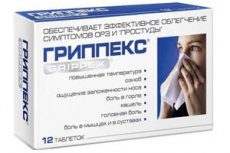該文的醫學專家
新出版物
叼纸牙
阿列克谢·克里文科,医学审稿人
最近審查:04.07.2025
最近審查:04.07.2025

Grippex 是一种用于缓解感冒和流感症状的复方药物。它含有三种活性成分,每种成分都发挥着特定的作用,以对抗各种疾病症状:
- 扑热息痛(乙酰氨基酚)- 具有解热镇痛作用。扑热息痛可有效退烧,并减轻头痛、肌肉痛、咽喉痛等疼痛。
- 盐酸伪麻黄碱是一种血管收缩剂,有助于减少鼻腔和鼻窦肿胀,使呼吸更顺畅,减少鼻塞。
- 氢溴酸右美沙芬是一种镇咳药,作用于大脑的咳嗽中枢,有助于减少咳嗽。
適應症 叼纸牙
- 发烧:Grippex 含有对乙酰氨基酚,有助于降低体温和缓解发烧。
- 鼻塞:Grippex 中含有的盐酸伪麻黄碱是一种减充血剂,有助于收缩鼻腔血管,从而减轻鼻塞并使呼吸更顺畅。
- 咳嗽:氢溴酸右美沙芬是一种镇咳药,有助于减少咳嗽的频率和严重程度。
- 身体疼痛:扑热息痛还具有镇痛作用,可以帮助缓解流感和感冒常伴随的肌肉和骨骼疼痛。
- 全身不适:Grippex 可以帮助改善您的健康状况,缓解普通感冒和流感症状,如虚弱、疲劳和烦躁。
發布表單
Grippex 通常以片剂或悬浮粉的形式提供。
藥效學
- 扑热息痛:这是一种镇痛药和解热药。扑热息痛有助于退烧,并缓解流感和感冒引起的疼痛。
- 盐酸伪麻黄碱:这是一种拟交感神经药,用于减充血剂中以收缩血管并减少鼻粘膜肿胀,从而缓解鼻塞并改善呼吸。
- 氢溴酸右美沙芬:这是一种镇咳药,通过作用于大脑中的咳嗽反射中枢来抑制咳嗽,有助于减少咳嗽的频率和强度。
藥代動力學
Grippex 含有对乙酰氨基酚、盐酸伪麻黄碱和氢溴酸右美沙芬,其药代动力学包括每种活性成分的吸收、分布、代谢和消除。它们在体内的作用机制如下:
对乙酰氨基酚(乙酰氨基酚)
- 吸收:对乙酰氨基酚经胃肠道快速且几乎完全吸收。口服后约30-60分钟达到最大血浆浓度。
- 分布:对乙酰氨基酚均匀分布于全身大部分组织。分布容积通常约为1升/千克。
- 代谢:在肝脏中代谢。主要代谢途径包括与葡萄糖醛酸或硫酸盐结合。一小部分经细胞色素P450代谢,形成毒性代谢物N-乙酰-对苯醌亚胺,该物质可被谷胱甘肽中和。
- 排泄:主要以代谢物形式经肾脏排泄,不足5%以原形排泄。
盐酸伪麻黄碱
- 吸收:伪麻黄碱经胃肠道吸收,给药后1-3小时达到血浆峰浓度。
- 分布:具有相对较高的分布量。
- 代谢:在肝脏中代谢有限。
- 排泄:大部分剂量以原形经肾脏排泄。
氢溴酸右美沙芬
- 吸收:口服后右美沙芬吸收迅速,约2-4小时达到血浆峰浓度。
- 分布:广泛分布于全身组织。
- 代谢:广泛在肝脏中代谢。主要代谢途径包括CYP2D6的N-去甲基化,从而形成活性代谢物右啡烷。
- 排泄:主要通过肾脏以代谢物的形式排泄。
劑量和管理
使用方法:
- Grippex 是口服的。
- 该药物应用水服用,最好在饭后服用,以尽量减少对胃部的刺激。
- 应整片吞服药片,不要咀嚼或压碎。
剂量:
- 成人及12岁以上青少年:建议剂量为每4-6小时服用1-2片,具体剂量取决于症状。24小时内不得超过8片。
- 儿童:除非医生开处方,否则不建议 12 岁以下儿童使用 Grippex。
重要注意事项:
- 最大剂量:重要的是不要超过建议的最大剂量,特别是对乙酰氨基酚,因为这会导致严重的肝损伤。
- 副作用:注意可能出现的副作用,例如头晕、失眠、高血压或过敏反应。如果出现这些症状,请停止服药并联系医生。
- 药物相互作用:伪麻黄碱可能与其他药物(包括抗抑郁药和降压药)发生相互作用。请咨询您的医生或药剂师了解可能的相互作用。
- 特别警告:患有心脏病、高血压、糖尿病、肝病或肾病的患者在服用 Grippex 前应咨询医生。
在懷孕期間使用 叼纸牙
怀孕期间使用 Grippex 需要谨慎,并且只能在咨询医生后使用,因为它所含的物质组合可能对孕妇和胎儿产生不同的影响。
扑热息痛:
- 一般来说,按推荐剂量服用扑热息痛在孕期是安全的。然而,应谨慎使用,并遵医嘱,以免过量服用,导致母亲和胎儿出现严重并发症。
盐酸伪麻黄碱:
- 伪麻黄碱可能会增加心血管不良反应的风险,例如高血压。一些研究表明,伪麻黄碱与出生缺陷风险相关,尤其是在妊娠早期服用。因此,许多医生建议避免使用伪麻黄碱,尤其是在妊娠早期和高血压女性中。
氢溴酸右美沙芬:
- 右美沙芬通常被认为在怀孕期间使用相对安全,但相关数据有限。使用前务必咨询医生,因为它存在潜在风险,尤其是在妊娠早期使用。
建议:
- 怀孕期间,服用任何药物(包括Grippex)前,都应咨询医生。医生会评估该药物对您的具体情况的潜在风险和益处。
- 您的医生可能会推荐更安全的替代方法来治疗怀孕期间的感冒和流感症状。
- 您还应该考虑其他安全措施,例如加湿空气、多喝水和休息,这些措施可能有助于在不使用药物的情况下缓解症状。
禁忌
- 已知个体不耐受:已知对该药物的任何成分(对乙酰氨基酚、盐酸伪麻黄碱或氢溴酸右美沙芬)不耐受的人应避免使用该药物。
- 怀孕和哺乳期:Grippex 应仅在医生建议下在怀孕和哺乳期间使用。扑热息痛被认为在这些时期使用相对安全,但伪麻黄碱和右美沙芬可能有限制。
- 儿童:此药仅供特定年龄段的儿童使用,并需遵医嘱。部分成分可能不适合特定年龄段以下的儿童。
- 高血压和心血管疾病:伪麻黄碱可能会升高血压、增加心率,因此高血压、动脉高血压、心律失常和其他心血管疾病患者应慎用。
- 前列腺肥大和泌尿问题:伪麻黄碱可能会加重前列腺肥大或泌尿问题患者的症状。
- 肾脏和肝脏疾病:对乙酰氨基酚在肝脏中代谢,因此对于患有肝病以及肾衰竭的患者,应谨慎使用并在医生监督下使用。
副作用 叼纸牙
- 嗜睡或烦躁:Grippex 中含有的盐酸伪麻黄碱可能会导致某些人嗜睡,也可能导致烦躁或紧张。
- 高血压:盐酸伪麻黄碱可能会升高血压,这对高血压患者尤其重要。
- 失眠:伪麻黄碱可能会导致某些人失眠或睡眠质量下降。
- 口干:这是氢溴酸右美沙芬的常见副作用,会导致口干。
- 胃肠道问题:有些人可能会因该药物中的某种成分而出现恶心、呕吐、腹泻或便秘等胃部问题。
- 过敏反应:有些人可能对 Grippex 中的任何成分过敏,并出现过敏反应,包括皮疹、瘙痒、面部肿胀或呼吸困难。
過量
- 扑热息痛:过量服用扑热息痛会导致严重的肝损伤,包括肝衰竭、肝炎,甚至肝坏死。如果短期内服用超过推荐剂量的扑热息痛,或饮酒,则尤其危险。
- 盐酸伪麻黄碱:过量服用伪麻黄碱可能引起高血压、心律失常、头晕、头痛、焦虑、失眠、幻觉等心脏问题。也可能出现血压升高和中枢神经系统兴奋。
- 氢溴酸右美沙芬:过量服用右美沙芬可引起嗜睡、头晕、头痛、恶心、呕吐、协调性丧失、呼吸抑制,甚至昏迷。也可能引起过敏反应。
與其他藥物的相互作用
- 含有对乙酰氨基酚的药物:与其他含有对乙酰氨基酚的药物一起使用时,可能会增加该物质过量的风险,从而导致肝损伤。
- MAO 抑制剂(单胺氧化酶抑制剂):伪麻黄碱可能会加重血清素综合征的症状,尤其是与 MAO 抑制剂一起使用时。
- 降血压药:伪麻黄碱可能会增强降血压药的效果,从而导致高血压危象。
- 中枢神经系统 (CNS) 抑制剂:右美沙芬可能会增强中枢神经系统抑制剂(如苯二氮卓类、巴比妥类、酒精)的抑制作用。
注意!
為了簡化對信息的理解,本指令使用了藥物 "叼纸牙",並根據藥物的醫療用途官方說明。 使用前請閱讀直接用於藥物的註釋。
描述僅供參考,不適用於自我修復指導。 這種藥物的需求,治療方案的目的,藥物的方法和劑量僅由主治醫師確定。 自我藥療對你的健康有危害。


